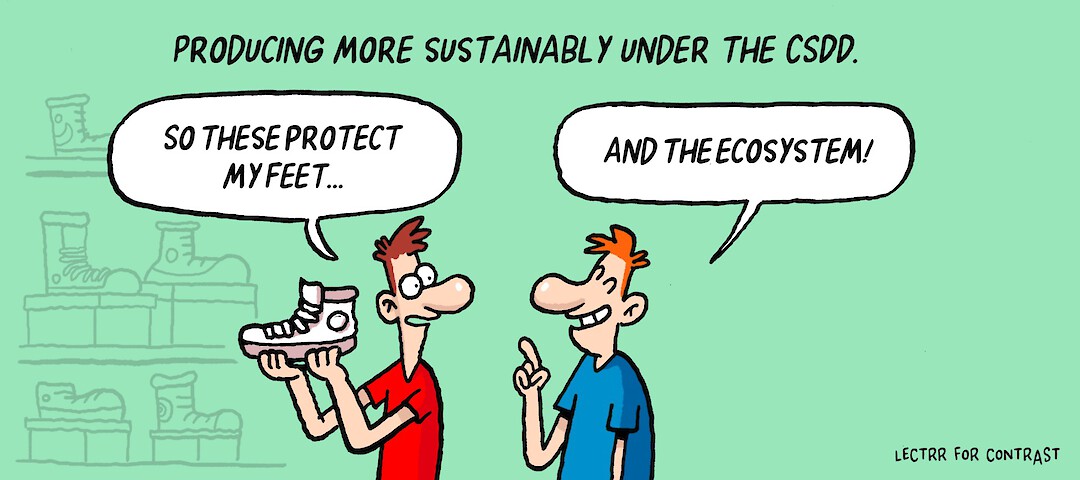In the Picture

Brace yourselves, CSDD is coming!
November 2022Imagine...
You work as a buyer for a large European leisurewear manufacturer. You have been working closely with a foreign supplier of textile fabrics for many years.
One day, your compliance officer knocks on your door and shows you a series of articles about working conditions and wastewater discharges that have led to protests against that supplier from local action groups.
The commercial terms you enjoy with that supplier are very advantageous. Your conscience gnaws, but you still want to maintain the relationship. Moreover, you have contractually placed any liabilities pretty much exclusively on the supplier. Are you really at risk then?
A brief clarification.
In February 2022, the European Commission proposed a directive on "corporate sustainability due diligence" (the Corporate Sustainability Due Diligence Directive or CSDD). The aim of this directive is to promote sustainable and responsible corporate behaviour and encourage companies to address the negative impacts of their actions, both within and outside Europe. In doing so, it aims to further embed human rights and environmental considerations in business.
Under the proposal, the CSDD will apply to European and non-European companies of a certain size, which varies depending on whether the company operates in a high-risk sector, such as textile production, food production, or mining.
The companies concerned will be required to identify, prevent, mitigate and eliminate negative human rights and environmental impacts not only of their own operations, but also those of their subsidiaries and their established business relationships (suppliers, distributors, agents). The CSDD proposal refers, for example, to the use of child labour, working conditions, pollution and loss of biodiversity.
Companies will have to integrate appropriate due diligence for these issues into their policies and communicate about them publicly. They will be able to do this, for example, by including contractual guarantees that require a supplier to comply with a code of conduct and preventive action plans. If those measures are insufficient, the company will have to refrain from entering into or expanding its business with that supplier, temporarily suspend that relationship or, if the effects are severe, even terminate the relationship. The CSDD could thus have far-reaching implications for the commercial relationship between our European leasurewear manufacturer and its supplier in disrepute.
The group of largest companies will also have to develop a plan to align business strategy with the transition to a sustainable economy and limiting global warming to no more than 1.5°C.
All the directors of the companies concerned will have to establish a due diligence process, integrate this into the corporate strategy and monitor and update its implementation annually. Thus, they will also have to consider the human rights, climate change and environmental implications of their decisions. Otherwise, their directors' liability will be compromised.
For the purposes of the CSDD, companies will have to foresee a procedure whereby victims or interest groups can file a complaint against the activities of the company concerned or those of its suppliers or distributors. If the complaint is well-founded, that company will have to take appropriate action to address the adverse impact.
The CSDD will further be monitored by a new regulator in each member state. It will have the power, on its own initiative or on the basis of a complaint, to conduct inspections and impose sanctions, including fines and injunctions to stop or remedy violations of the CSDD. Victims will also be able to obtain compensation from the company concerned for damages resulting from its failure to take appropriate measures to prevent, mitigate and terminate adverse effects.
In addition to the CSDD proposal discussed here, in April 2021 the Commission also already published a proposed directive on appropriate due diligence reporting (Corporate Sustainability Reporting Directive). In addition, the regulation on sustainability disclosures in the financial services sector (Sustainable Finance Disclosure Regulation) is applicable since 10 March 2021. Finally, since 1 January 2022, the Delegated Regulation on technical screening criteria for climate change mitigation (Taxonomy Climate Delegated Act) has come into force.
What's next?
The CSDD proposal is currently undergoing its first reading by the Council of Ministers. Substantive amendments during the legislative procedure are likely. After adoption by the Council and the European Parliament, the EU member states will have 2 years to transpose the directive into their national law.
Concretely.
- Under the CSDD, large companies and companies operating in specific high-risk sectors will have to consider the human rights and environmental impacts of their own behaviour, that of their subsidiaries and their value chain, in a more streamlined manner.
- Negative human rights and environmental impacts will have to be identified and prevented, mitigated or terminated using appropriate measures. Such reflexes will have to become part of corporate strategy and be monitored by the companies’ directors.
- Each member state will have a new regulator that can impose fines and subpoenas for violations of CSDD obligations.
- Victims will be able to obtain compensation for damages resulting from non-compliance with CSDD obligations and the companies within the scope of CSDD will have to organise their own complaints procedure.
Want to know more?
- Proposal for a Directive of the European Parliament and of the Council on due diligence in corporate sustainability.
- The European Commission's information page on the proposed directive can be found here.
- The European Commission's information page on the European Green Deal can be found here.
Please consult our website or contact one of our team members if you have questions or require more information:












